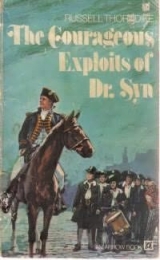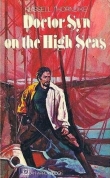
Текст книги "The COURAGEOUS EXPLOITS OF DOCTOR SYN "
Автор книги: Russell Thorndike
Жанр:
Исторические приключения
сообщить о нарушении
Текущая страница: 3 (всего у книги 16 страниц)
2
THE TWO HEARTS
On arrival they were met by some thirty Nightriders, masked and cloaked, who had already tethered their horses in
the large farmy ard. The leader’s horses were taken to the stables, and as soon as the Scarecrow was satisfied that a
look-out had been placed to guard against any surprise attack, he entered the Oast House, followed by his men.
The interior was lighted by lanterns, and the three leaders sat upon barrels, facing the others who were ranged
against the circular brick wall.
The doors were safely barred, and then the Scarecrow addressed them, calling each man by the name he went by
in the gang.
Indeed, for everyone’s security, no one knew rightly just who his colleagues might be in the ordinary way of life
upon the Marsh. This guarded against any personal betrayal, and gave to each the same feeling of security as the
Scarecrow himself enjoyed. Certainly not one of them had any idea who the great leader was, and though they
might have had a shrewd guess as to one or two identities, the only one they were sure about was Sexton Mipps,
since whether he was dressed as Hellspite or himself, he was the voice of the scarecrow when the leader was not
present.
With the utmost patience the Scarecrow explained the new code and put each man through a rigorous
examination of it.
“Now, Curlew,” he would say in his croaking voice which he always used when playing the Scarecrow, “suppose
Percy carries a wooden diamond floating in his right bucket, and a club in the left, what will you know by that?”
“That the cargo is to be landed at Herring Hang. Scarecrow,” came the answer in the singing tone used by the
Nightriders to disguise their ordinary speech.
“Correct,” replied the Scarecrow. “And now, Raven, if the signs were reversed, what then?”
“Littlestone Beach, Scarecrow,” came the sing-song answer from him who bore the title of the Raven.
It was a long and tedious business, since half of the Nightriders were more valuable in brawn and muscle than
brains, but as Mipps remarked to his master later, Doctor Syn showed the same care in teaching his wild class as
ever he did as the Vicar in the Sunday school.
At last, when satisfied that each of them knew every signal, including those who had been on guard outside
whose places had been taken by those who had learned the code quickest, the Scarecrow warned his men that
Captain Blain would be a real danger, since he was a man of ingenuity, but that if they kept rigidly to the orders he
gave, they could feel confident that the ‘runs’ would be carried out in safety.
He then dismissed them with the order to be prepared for a big ‘landing’ on the following night, and to keep a
weather-eye open for the water-carrier’s buckets.
By ten o’clock Doctor Syn was supping pleasantly with the Captain, but though he gave his guest many details of
the Scarecrow’s past achievements, he was still unable to make the Captain communicative concerning his own
plans, save that he intended to take his men for a night march in order to accustom them at once into the sort of night
work they would be called upon to carry out till the Scarecrow was caught and placed in irons.
“We shall be setting out at midnight, Vicar,” he said.
“Has I not a sermon to prepare against next Sunday, I might have offered you my services as a guide,” replied
Doctor Syn. “But I shall be working after midnight, I fear. My parish is so scattered, and I have so many of my
flock down with the Marsh ague, that I get little time for study during the day, and even in the night hours I am no
more free from being called from my bed than is our good physician Doctor Pepper.”
“Ah well,” said the Captain, “we shall steer a safe enough course I make no doubt, even though it may be taken
by cutlass point. And if you will kindly loan me a key to your front door, I shall be able to let myself in without any
disturbance.”
Doctor Syn did not sit up long after midnight. He did not need to prepare a sermon. He could always depend
upon his own ready tongue when the moment came. It amused him to preach dry-as-dust sermons, because no man
in the Church had an easier facility for preaching good ones that gripped a congregation when he felt the occasion
warranted it. He only became dry-as-dust, to prevent his own preferment in the Church. He did not seek publicity
or popularity as a preacher because it would not have suited his book at all to be transferred from little Dymchurch.
Knowing the value of conserving his strength, he went to bed and to sleep directly the Captain had set out,
knowing also that for that night at least the sea-dogs could do no harm upon the Marsh, which they would find
utterly deserted.
He was awakened by Mrs. Fowey, the housekeeper, with a cup of chocolate at nine o’clock, and so good a host
he was that he ordered her to let the Captain sleep.”
“I have no idea when he came in from his duty,” he said, “but I told him to ring when he woke and needed
chocolate and shaving water. Did you hear him come in?”
Mrs. Fowey had not.
As it happened the Captain had let himself in very quietly about six o’clock, for Percy had seen the sailors return
muddy and weary when he was working the windlass for his first pair of buckets, which he carried round to the
Coffin Shop earlier than usual, since he was anxious to see the new pieces of wood which Mipps had told him about
the night before.
He found the Sexton still in his hammock when he peeped through the open casement, and blew loudly upon his
whistle.
“Belay there with that pipe,” ordered Mipps, “while I lights up mine. Then I’ll show a leg and let you abroad.
Mipps stretched and yawned, and then took a tinderbox from the oak beam above his head and lit his short clay
pipe. He then gripped the beam with his fingers, and unhooked the head end of the hammock, then swinging
himself along to the other end he let the hammock fall to the ground, dropping down lightly on the top of it. He then
rolled it up in man-of-war’s fashion, and stowed it away upon a shelf. All this time clouds of tobacco smoke
surrounded his head. He went to the door and raised the bar, letting Percy in.
“There are your floats,” said the Sexton, pointing to eight neatly chiselled pieces of wood which lay on the coffin
lid
While Percy lifted them carefully one by one, with many a gurgle of delight, Mipps went to another shelf and
took down a tin which Percy knew of old contained snuff.
“You’ll keep them signs here, my lad,” announced the Sexton, “ and each morning I’ll tell you which ones we’ll
put in, eh? Sometimes we’ll have hearts, and sometimes diamonds, clubs or spades, as the fancy strikes us, eh?: I’ll
wager the villagers will be wondering every journey you take which ones will be floating in them bucket. I
shouldn’t be surprised if it don’t encourage betting more than a race-meeting.”
“Will you chooses one and me choose one?” asked Percy, “or do we go turn and turn about?”
“We’ll always ask Judy,” replied the Sexton solemnly, “and I’ll go and ask her now.”
Judy was the mane of a wooden idol which Mipps had acquired in the east Indies. A female figure with large
ears, sleepy-looking eyes, and elaborately carved necklace upon her naked breasts, a tall head-dress and a skirt with
carved snakes all over it. Her hands were clasped upon her middle as she stood with bare feet upon hr block of
wood.
This brown figure, which was about a foot in height, possessed Percy with vague terrors for the soul of mister
Mipps. He thought it misguided of a Christian sexton to posses an idol, until its owner had assured him solemnly
that he had himself baptized the goddess into the Christian Faith, and given her the good name of Judy in place of a
long heathenish title which he had never been able to pronounce.
Mipps held a piece of parchment in front of the idol and thrust his little finger through the crook of her arm.
‘Now, Judy, my beauty,” began the Sexton,” we wants you to point out with the help of my finger, since you
can’t move your own off your belly, which floats will be lucky for Percy to place in his buckets. Take your time,
my girl, and choose. First which of these signs goes in the right one. Here they all be drawed out very nice. What
do you say?” He put the idol up to his ear, as though it was whispering to him. “Oh, I see. Well certainly, having
been a goddess you’ve every right to have you own say in it. You don’t want to choose from the drawings, eh? You
wants to choose the bits of wood yourself and give ‘em to Percy into his own paws, eh? Well, then, we shan’t be
wanting the drawings any more then since the signs is all made shipshape, so we’ll throw it away? Certainly.” He
crumpled up the parchment and dropped it on the floor behind the coffin which served as his counter.
He then thrust his other little finger through the other crook in her arm and walked the idol up and down the
coffin lid as though it was viewing the various pieces of wood. He then made the figure stoop, and with his fingers
he lifted up one of the two aces of clubs.
“There you are, Percy,” said Mipps solemnly. “Take it from her and hold it in your right hand while she
considers the other one.” This time he made the idol pick up one of the diamond shapes, which Percy accepted in
his left hand, giving the idol an absurd little bob of respect.
“So that’s settled all very amicable,” went on the Sexton. “Put the club in you starboard bucket and the diamond
in the port. And mind you, Percy, if you was to change them without Judy here telling you, she’d bring the most
‘orrible disaster upon you, me and the village, not to mention Squire and the’oly Vicar. So don’t you change ‘em
for no one, see?”
Percy did as he was ordered, and stooped down to place the floats carefully at the bottom of the empty buckets,
for he had poured the water into the cask as he had come into the door.
Mipps, thinking him to be occupied below the coffin with his buckets, very quickly picked up the parchment he
had thrown down, but Percy saw him do this through the trestles on which the coffin rested, and he wondered why
Mipps who had thrown away the paper should pick it up again, and place it with so much care and so furtively inside
the old tin containing the snuff. He would have liked to have seen that parchment with the drawings, and was about
to ask Mipps if he might do so, when there suddenly dashed through the open door a fisherman named Hart, who,
seeing Percy, shouted out, “ Where’s Mipps?”
“Here he be,” replied that worthy, looking round from the dark corner where the shelves were. “What do you
want, mate? Something wrong?”
“Aye, big trouble, Sexton,” explained the fisherman, who was almost out of breath with running.
‘Trouble?” snapped Mipps, and Percy wondered why he put his finger to his lips, and glanced angrily first
towards the fisherman and then in his direction.
“Personal trouble,” replied Hart. “Nothing to do with King’s men or wicked smugglers. No. It’s that our boat
has been washed up on the tide and badly holed. She’s empty, too, and my young bother had her out last night.
May I have the loan of yours to search for him?”
“Of course, mate,” replied the Sexton, quickly pulling on his coat. ‘I’ll come along and lend a hand. Poor young
Fred. Not come back, eh? And his wife with a new-born kid.”
“Aye, and what seems to make it worse,” went on Hart, “is this day being the old folks’ Golden Wedding. The
only hope is that Fred may have got picked up, but it’s slender.”
“Aye, maybe, by some vessel that couldn’t put him ashore immediate like, replied Mipps. “There’s a good
chance of that, I should say. Fred’s a good swimmer and a strong enough lad, and there weren’t a great sea running
last night. Come along. We can pull round to Dungeness and see if we can hear nay news of him. Last night’s tide
ran that way.”
As he hurried to the door he looked at back at Percy. “Stow them other floats on the shelf there, my lad,” he
ordered, “and don’t go changing ‘em from what we said whatever happens, mind.”
Left alone, Percy’s curiosity got the better of him, for as he placed the spare pieces of wood on the shelf his hand
touched the tin of snuff. There could be no great harm in opening it, he thought, and having a look at the drawings
from which Mipps had fashioned the floats.
When he took the lid off and peered inside, he could see nothing but the dark brown stuff, and no sign of the
parchment. But he remembered that Mipps had given the tin a good shaking, and had thus covered it up with the
snuff. Percy wondered whether he had done this on purpose. Why should Mipps want to hide a small piece of
parchment which he had already crumpled up and thrown carelessly away and then picked up again? Percy put his
ling fingers into the tin, and sure enough he found the parchment buried beneath the snuff. He drew it out very
carefully, anxious not to spill any of the brown dust, which made Mipps sneeze so heartily. He somehow did not
want Mipps to know that he was prying. The little sexton might not like it, he though, and he did not want to vex
one who had shown him such kindness.
He looked at Judy, and was relived that her eyes appeared to be close shut beneath her heavy, languid lids. He
hoped she wouldn’t tell the Sexton what he was doing, but for the life of him he could not resist the temptation. He
had meant to ask the Sexton if he might see it when all was said and done, and this though weighed with him and
gave him a little comfort.
Now although Percy had done little good for himself at school, partly because he hated the master, Mister Rash,
who had no patience with him, and made him a butt upon all occasions, and partly because everyone calling him the
Village Idiot, he took no pains to make them think otherwise, he had at least mastered the alphabet, and could spell
a few words of one syllable. In spite of this limitation he yet knew all the names on the local signposts, and no
sooner had he spread out the piece of parchment, than he recognized that here was a list of familiar places, against
which were sketches of his bits of wood. There, for instance, was the starboard club and the port diamond,
commanded by Judy, and against them was the name Littlestone Beach. After some difficulty he made out the word
at the top of the list to be LANDINGS. Two hearts together against ‘Dungeness, Sou’ west’, made him think of this
sudden trouble to the Hart family.
He not only liked Fred, who had always been kind to him, but he knew how much the old people had looked
forward to the golden Wedding, which was to be a day of great rejoicing, and now it seemed all was spoiled. As he
stowed away the list into the tin and covered it once more with the snuff, his eyes filled with tears of sorrow for the
Harts, so to clear his snivelling, which he had no wish for the parish to see upon his first day of rounds with his new
floats, he stole a good pinch of snuff, had a prodigious sneeze and felt better.
Then with the ace of clubs in his right bucket and the diamond ace in his left, he went back to the well to refill.
Now although the Hart tragedy was the source of village gossip, he could not fail to notice that at each cottage
particular interest was taken in his bits of wood.
Some folk said how good it was of the Sexton to have taken so much pains, and others praised the workmanship
and quaint design. As the interest continued throughout his round, Percy thought of that piece of parchment in the
tin of snuff, and quite suddenly, from one of the livelier cells in his queer and generally sluggish brain, he became
aware of a startling fact which he realized was true, namely, that he was being used to carry these signs at the
Scarecrow’s orders. He knew well enough what the word
LANDINGS signified at the head of the mysterious
list. He knew that there were no landings carried out upon the neighbouring coastline that were not the work of the
Scarecrow. The signs in his buckets meant Littlestone Beach. In spite of the utmost care exerted by all concerned
not to give themselves away when a landing and a run was contemplated, there was a something in the air that made
Percy suspicious. On such nights he would never go out late to dig lug for his patron, Mipps. In fact, Mipps would
generally tell him that he was not in need of lug upon such occasion.
The more Percy thought about it, the more he was convinced that he was being used by the dreaded Scarecrow,
and frightened as he wa s of the gallows permanently standing so close to his well, he was more scared of the
Phantom Rider of the Marsh and his followers of whom such dreadful tales were told.
It was this terror that persuaded him at all costs to keep his dreadful discovery to himself, and not to mention it
even to his mother.
He tried hard to forget what he had guessed, but found it impossible, and to make matters even more frightening
he made another discovery that very evening at the start of his last water-round, which set his heart thumping with
fear.
He was about to enter the open door of the dark barn in which the sailors were billeted when he heard a moan as
of a man in pain. Now Percy had a hatred of pain which made him almost hysterical. He could not bear pain
himself nor to see it in others, and this pitiful moaning coming from the darkness frightened him, and he wished that
there had been a sailor mounting guard outside the barn as there had been in the morning when he had delivered the
water. He then realized that in the morning he had approached the barn from the other side which was the main
entrance. The open door faced the Marsh and not the village. The guard would therefore be outside the closed door
on the opposite side.
Percy stood still and listened. He could hear nothing but those whimpering moans, and thought it must be some
sick sailor left by himself in the barn while his fellows had gone out on duty. He tried to make up his mind what
was best to be done. In the morning the sailor on guard had taken in the buckets of water, saying that Percy was not
allowed abroad. The water cask was inside the barn, and it sounded as though the sick sailor would not have the
strength to take in the buckets, which Percy had no intention of leaving.
It looked therefore as though he must disobey the orders of the morning sentry, and go boldly in himself. It never
occurred to him to go round to the other side of the barn and find the sentry. But there was so much to be afraid of.
The Scarecrow, who was using him to carry messages, without asking his consent, and the sailors themselves. He
was water-carrier to the dragoons, too, and would it infuriate the Scarecrow that he was thus doing service to the
enemies of the Nightriders?
It was then that the groans rose into a pathetic squeal, like that of a trapped animal. Percy suddenly thought
about the story of the Good Samaritan which Doctor Syn had told them about in Sunday school. Christian charity
told him it was his duty to go and see if he could help this sufferer. Perhaps a drink of water would do him good.
He was just going in, on this resolve, when he was pulled up sharp by a voice which he recognized at once as
Captain Blain’s, and its very first sentence made him go weak at the knees.
“That’s enough for the moment, men, or he’ll faint, and an unconscious man cannot give information, and that
we have got to get.”
The relentless tone of that deep husky voice frightened Percy enough, but the words that followed brought a
sweat of panic on to his brow.
“Now, Fred Hart, if that’s your name as I understand, think well. The village thinks you dead. Why? Because
we stoved in your boat. If you persist in refusing to tell me what I wish to know, in the King’s name, I’ll have you
shipped aboard a man-of-war quicker than the Press gang, and no one here will be any wiser. Your conscience tells
you not to be disloyal to your fellows, eh? Well, it is better that you should be when is comes to proving yourself
loyal to your Kung. No man can be blamed for obeying the law of his country, and you have the fortunate
opportunity of being able to atone for your law-breaking by a full confession. If you do the right thing and follow
now the straight path of your duty, you will be accorded safety and reward. If you do not, I can either ship you to
sea, sell you to the Plantations, or, to save a lot of trouble, string you up to the yardarms as a member of this
Scarecrow’s gang. I’ll pledge you my word not to ask awkward questions concerning your own relations. That
bother of yours for instance, who is no doubt as implicated as you are. Blood is thicker than water as the saying
goes, and you should think of your wife and kid. Now then, am I to extract this information by ordering my men to
give you another dose of pain, or do you want to go home with money for your wife and kid? If it’s information got
from torture I warn you there will be no reward and no pardon. If you tell me now with freewill, I’ll see that no one
knows from whom I gained information.”
“The Scarecrow knows everything,” replied Hart’s voice, which, though very weak, Percy recognized.
“And you’re afraid of what he’ll do to you, eh?” retorted the Captain. “Well, I give you my word, he’ll not be
able to do a thing, for he’ll be swinging before he knows a thing against you. Now come along, Hart. You’ve
shown yourself a brave man, according to your lights, and I’ve no wish to duty, and I must do mine. No? Well your
damned obstinacy means good-bye to your wife, kid and home. Give him another, men.”
Whether they did nor not, Percy was not sure. The sharp squeal which Hart let out may have been due to a
horrible anticipation. But the squeal was short -lived and tailed into the sentence of, “I’ll speak and god help me.”
“Sensible fellow,” came the Captain’s voice in a kinder tone. “Now then, Hart, I must know first when and
where the next contraband is going to be landed.”
Percy listened to the weak voice almost whispering: “Tonight, sir, on Littlestone Beach at the low tide. The
Scarecrow will be there, and if you can discover who or what he is you’ll be wiser than any of his followers. Now
set me free in God’s name and let me go home.”
“When I know that your information is correct you will be let go,” replied the Captain’s voice in a tone of
triumph.
Just then Percy had a narrow escape.
A sailor swung out of the darkness and pulled up quickly in the doorway s he saw the unexpected water-carrier.
Percy knew that the agitation he had gone through over what he had overheard must show clearly on his face.
The sailor had every reason to suspect that he had been listening to the Captain interviewing Hart. But Percy was
too quick for him by doing nothing quickly. Very slowly he set the buckets down and unhooked the yoke, allowing
the pain written upon his face to appear as though it had been written there by fatigue.
“Water, sir,” he said wearily.
The whole bearing of the lad convinced the sailor that he had only just got to the door, but to make quite sure he
asked, “Been waiting long, lad?”
“You saw me put them down,” replied Percy, indicating the filled buckets. “P’raps some ‘ud hold ‘em standing
still, but I has enough of ‘em when walking. Shall I bring ‘em in?”
“You stay here.” Ordered the sailor. “I’ll take ‘em and show our Captain your clever dodge with them bits o’
wood. I was telling him how you prevent your legs from being splashed, but he didn’t see the buckets come abroad
this morning same as t he rest, and he’ll be interested.”
While waiting for his buckets to be returned empty, that live cell in Percy’s brain worked clearly for the good of
the parish. It told Percy that it had been the bits of wood that had enabled poor Fred to turn traitor against the
Scarecrow, and Percy knew that would mean the rope for anyone caught that night upon Littlestone Beach.
Now is the ‘landing’ was changed to the far side of Dungeness, thought Percy, the smugglers would be hidden by
the promontory. He remembered that two hearts stood for Dungeness Sou’west on the list,. If he changed the signs
it would at least be a warning to those concerned.
When Percy got an idea into his head he would carry it out with a stubbornness that showed grit, and so directly
he received back the buckets he hurried off to the Coffin Shop to find Mipps and to change the signs.
It so happened that Mipps was at the Vicarage, but the door of his store being open, Percy entered and went
straight to the shelf upon which stood Judy, the idol.
“Got to change ‘em, Miss Judy,” said Percy, as he picked up the two hearts in place of the club and diamond. “If
the Sexton was here I’d ask him, but as he ain’t, I asks you. As you’re a good Christian idol, please make the
Sexton know that I done it for the best. I’ll be glad of your good word, Miss Judy, and thankee.”
Percy continued his round to the cottages, and when he saw what a deal of surprise and runnings and whisperings
the two hearts in the buckets caused, he knew that his theory was right. But for his own inner satisfaction he
determined to prove it in his own defense, and if possible do something more to save the village from disaster, and
so, since he had not met Mipps anywhere during the evening, and therefore had to continue to work on his own
initiative, such as it was, he informed his mother at supper that since the Sexton had been so kind to him he was
going to give him a surprise by digging him some lug.
He set out with his spade and tin, digging along just above the water line. He took no lantern, for the moon was
full, and he worked his way towards Littlestone. He met no one on the way, and no one could see him from any
distance, as the flat sands were swept by lowlying wreaths of mist. This made it an ideal night for the King’s men,
who lay in ambush behind one of the great wooden breakwaters.
Percy first sensed their presence by hearing a horse neigh, and as he crept towards the shadow of the sea-wall, the
moon caught the glint of a Dragoon’s helmet on the beach beyond.
As he crouched listening, the only sound that reached him above the continual swish and grinding of the waves,
was an occasional creak of leather, or the champing of a bit.
He wondered whether the sailors were on the same section of beach, or somewhere hidden on the Marsh behind
the sea-wall. He realized that any Dymchurch man who had not received his warning would walk into a trap here,
and so he retraced his steps and on the smooth sand drew with his spade two large hearts side by side.
He then made his way back to the village and went to bed. He was fast asleep long before the scarecrow and his
lieutenant, Hellspite, galloped along the sands towards Littlestone.
Suddenly the Scarecrow pulled up his fierce black horse and pointed. The moon shone upon Percy’s hearts.
The Scarecrow’s companion had pulled up as suddenly as his master, and from behind the hideous mask of
Hellspite came Mipp’s whisper: “Dungeness, Sou’west. Someone has altered our plan.”
“Hold Gehenna,” ordered doctor Syn from behind the Scarecrow’s mask.
Hellspite took the bridle while his master dismounted and crawled forward toward the breakwater, listening.
He returned with the news that the Navy men were entrenched behind the breakwater and the squadron of
Dragoons were beneath the sea-wall.
“So the rival forces are working together against us after all,” he whispered, as he silently remounted. “Someone
has betrayed us, and someone has altered our plans, as you say. I would sooner have risked a brush with the enemy
than that anyone should dare to cancel the Scarecrow’s orders. On to Dungeness, by way of the Marsh.”
The mist concealed them as they rode up a sandy path that ran from the beach over the high sea-wall, and down
again upon the other side to the Marsh.
On reaching the far side of the Ness, after a wild gallop, they found everything ready for the landing, just as it
had been arranged for Littlestone. The gangs were set in parties of eight to a boat, and only waited the Scarecrow’s
arrival to begin operations. The beach was guarded by a cordon of thirty mounted Nightriders, and as Doctor Syn
rode down the beach, their leader rode up to meet him.
“In contact with the ships yet?” asked the Scarecrow.
“Aye, aye, Scarecrow,” replied the leader, whom Doctor Syn and Mipps knew to be the Highwayman, “and the
boats are ready loaded and waiting to pull in.”
The Scarecrow raised his right arm above his head, and immediately the thirty wheeled their horses and galloped
down to the water-line. The signal was given: three hoots of an owl, three cries of a curlew, and four screams of a
gull.
With muffled oars some twenty boats pulled in out of the mist and the waiting gangs waded into the water to
unload.
Doctor Syn watched the tubs coming ashore to be lifted upon the pack-ponies. Not only were the boats well
loaded, but great rafts of lashed barrels were floated in their wake and dragged ashore by ropes.
“A good landing,” whispered the Scarecrow.
“Aye, and thanks to the new code, every man got the warning of your changed plan.” Replied the Highwayman.
“They guessed you had some good reason for the change, and worked with a will to get here in time.”
“Aye, we would have had a rougher landing on Littlestone Beach, with a full ambush of soldiers and sailors to
contend with,” said the Scarecrow. “We must find out how they got information.”
“The two hearts in Percy’s buckets did the trick,” went on the Highwayman, “and we gave Littlestone a wide
berth.”
The Scarecrow looked at Mipps and whispered, “So that was it.”
“Aye,” replied the Highwayman, “and the boys have done nothing but whisper admiration for the Scarecrow’s
cleverness. Them signs in the buckets is certainly a master-stroke.”
“I marvel that I never thought of it before,” said the Scarecrow.
When the last barrel was ashore, and the pack-ponies loaded, the carriers slung tubs on their shoulders, and
guided by the thirty riders, the long trek across the March began. Doctor Syn waited till the last boat had pulled
back to the ships that were hidden in the mist. He heard the anchors shipped, and then across the water came the








